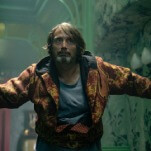Grant Buday: A Sack Of Teeth

According to countless works of fiction, a single day can change everything. The assertion rings true, thanks to the mind's habit of fixing upon and rehearsing selected memories as part of the construction of the self. If asked what day changed everything for them, many will talk about the day they met their future spouse, watched a child being born, or realized a calling. Others might relate something darker: the day the world turned upside down, and all the cultural myths and moral lessons fell apart. In 1965 Vancouver, in the home of Ray, Lorraine, and 6-year-old Jack Klein, it's the latter kind of day. Grant Buday's third novel, A Sack Of Teeth, takes place on Jack's first day of first grade with Mr. Gough and his ominously named Sink Or Swim system. "Nobody told him he'd have to know things," the book's epigraph pleads, expressing Buday's theme: the devastating impact when knowledge takes people by surprise. Restless Lorraine has bonded with Antoine, the downstairs lodger, an elderly European with dozens of canaries, but on the day covered in A Sack Of Teeth, she finds him dead by his own hand. Attempting to reach her husband with the news, she inadvertently stumbles across the affair he's conducting with his secretary. Ray, a war veteran and engineer who dreams of bridge-building, struggles to maintain the illusion of heroism and dominance that sustains him in the face of his family's disintegration. Meanwhile, Jack, reeling from the sight of kindly Antoine's empty eye sockets–the canaries had a few days to get hungry–makes an abortive attempt to escape from school, only to happen upon the kind of sight that might make a grown man gouge out his eyes. An American novel might set the entire drama against the backdrop of a day that changed everything for everyone: a historical turning point, such as the Kennedy assassination. But Buday, a Vancouver native, contends that the change that counts takes place within individuals isolated by sudden realizations, in moments when what was not even imagined becomes real. Knowledge doesn't connect Teeth's characters, instead placing them in altogether different worlds. Buday shifts perspective and voice in this three-character drama: He narrates, with equal facility, the self-justification of a philanderer, the weary daydream of a forgotten wife, and the terror of an inexperienced schoolboy. With haunting, soundless depths, he explores the pervasiveness of human cruelty, from its most deliberate, horrendous historical manifestations to the thoughtless, rationalized imprisonment of social institutions like education and marriage. Jack's inner voice echoes from the first and the final pages, as he's unable to make what he sees conform to the stories he's been told. In the face of inhumanity both great and small, everyone is a child without reason, myth, or plan of action.








































